|
|
||
|
HOME
|
US Navy -
ships
|
US Navy - air
units
|
USMC - air
units
|
International
Navies
|
Weapon Systems
|
Special Reports |
||
|
US Navy - Guided Missile Destroyer DDG 52 - USS Barry |
||
|
||
| 02/20 | ||
|
Type,
class: Guided Missile Destroyer - DDG; Arleigh Burke
class, Flight I Builder: Ingalls Shipbuilding, Pascagoula, Mississippi, USA STATUS: Awarded: May 26, 1987 Laid down: February 26, 1990 Launched: May 10, 1991 Commissioned: December 12, 1992 IN SERVICE Homeport: forward deployed to Yokosuka, Japan Namesake: Commodore John Barry (1745-1803) Ships Motto: STRENGTH AND DIVERSITY Technical Data: see: INFO > Arleigh Burke class Guided Missile Destroyer - DDG |
||
| images | ||
 general quarters drill - December 2019  East China Sea - November 2019  East China Sea - November 2019  departing from dry dock at Commander, Fleet Activities Yokosuka - December 2018  departing from dry dock at Commander, Fleet Activities Yokosuka - December 2018  departing from dry dock at Commander, Fleet Activities Yokosuka - December 2018  departing from dry dock at Commander, Fleet Activities Yokosuka - December 2018  Pacific Ocean - August 2017  Guadalcanal - August 2017  Guadalcanal - August 2017  Brisbane, Australia - July 2017  Brisbane, Australia - July 2017  Combat Information Center (CIC) - November 2016  Philippine Sea - October 2016  Busan, Republic of Korea - October 2016  Mk-45 Mod.2 gun fire exercise - Philippine Sea - October 2016  September 2016 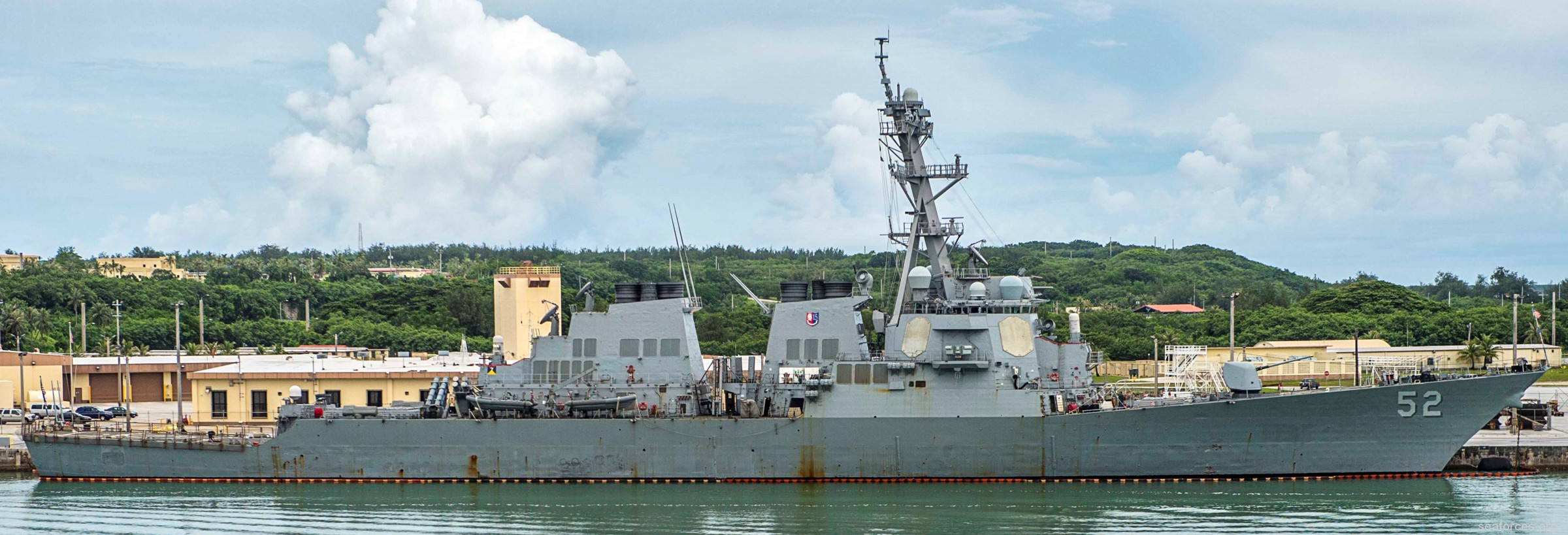 Apra Harbor, Guam - September 2016  Apra Harbor, Guam - September 2016  Philippine Sea - September 2016 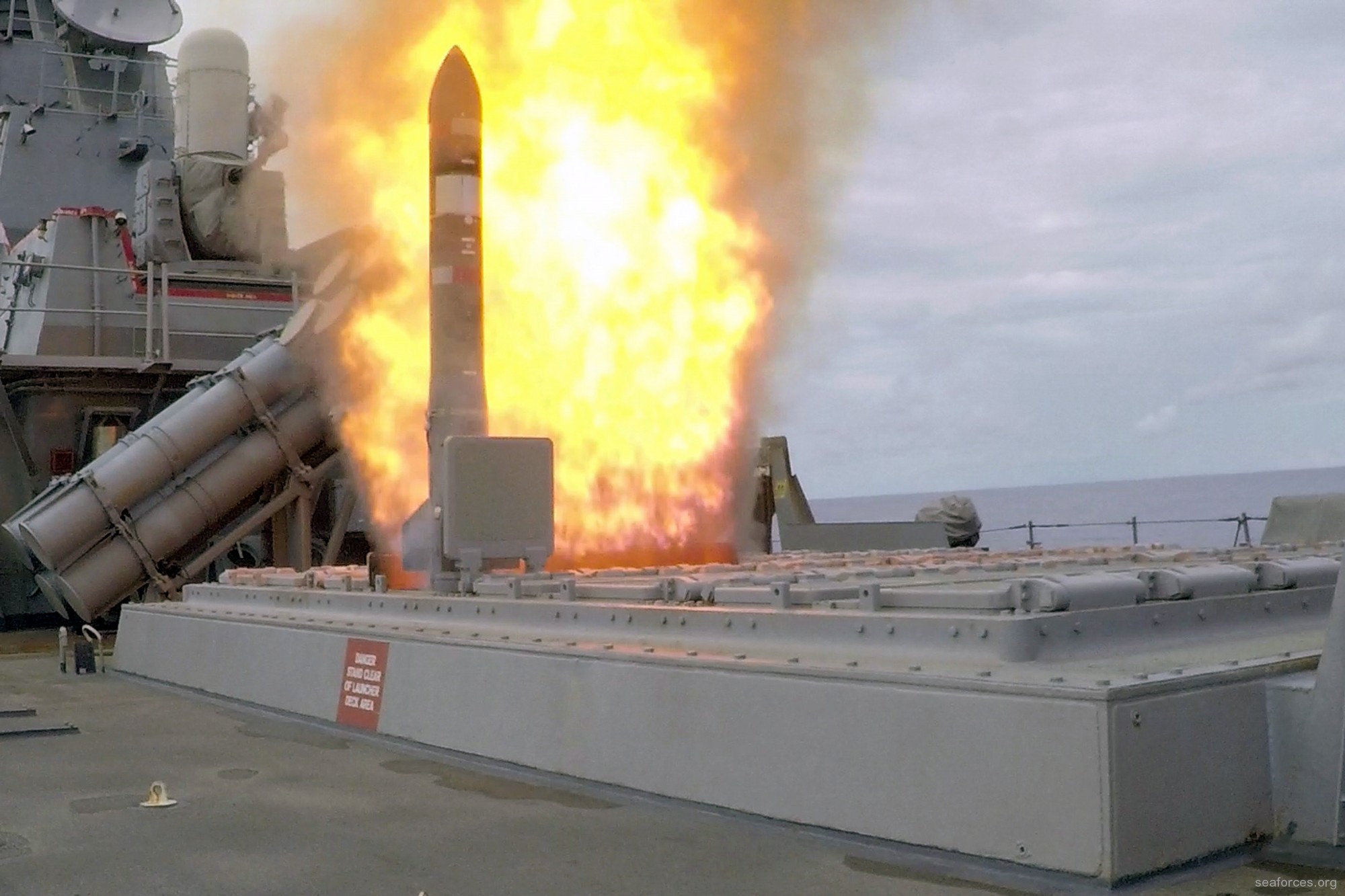 USS Barry launches a RUM-139 Vertical Launched Anti-Ship Rocket (VL-ASROC) during exercise Valiant Shield - September 2016  USS Barry launches a RUM-139 Vertical Launched Anti-Ship Rocket (VL-ASROC) during exercise Valiant Shield - September 2016  USS Barry launches a RUM-139 Vertical Launched Anti-Ship Rocket (VL-ASROC) during exercise Valiant Shield - September 2016  Philippine Sea - September 2016  sailors loading a RUM-139 Vertical Launched Anti-Ship Rocket (VL-ASROC) canister into the Mk-41 VLS - Apra Harbor, Guam - September 2016  Philippine Sea - August 2016  Sasebo, Japan - July 2016  Sasebo, Japan - June 2016  Pacific Ocean - May 2016  Yokosuka, Japan - May 2016  Yokosuka, Japan - May 2016  Yokosuka, Japan - March 2016  Yokosuka, Japan - March 2016 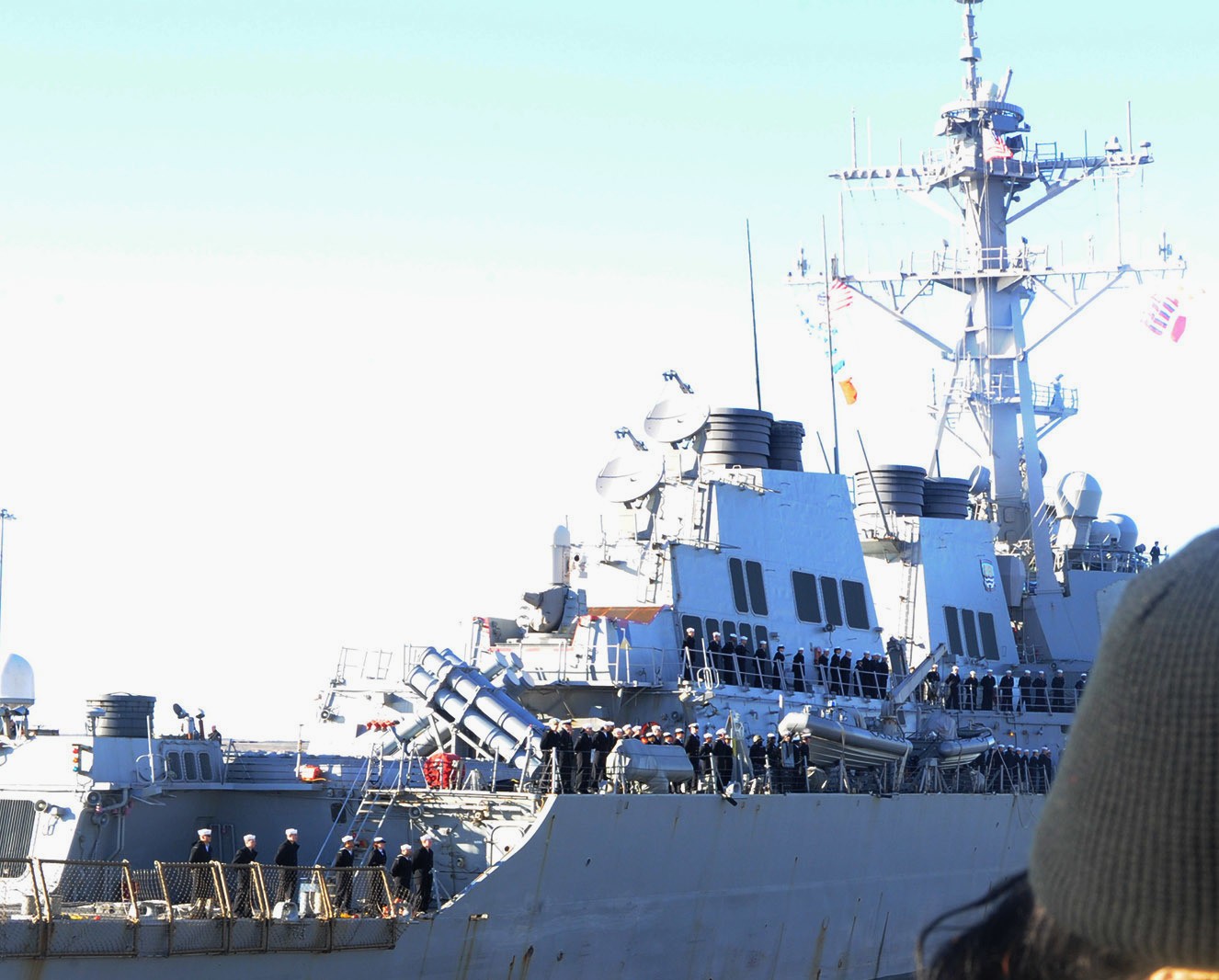 departing Naval Station Norfolk, Virginia for her new homeport Yokosuka, Japan - January 2016  New York - May 2015  New York - May 2015  New York - May 2015 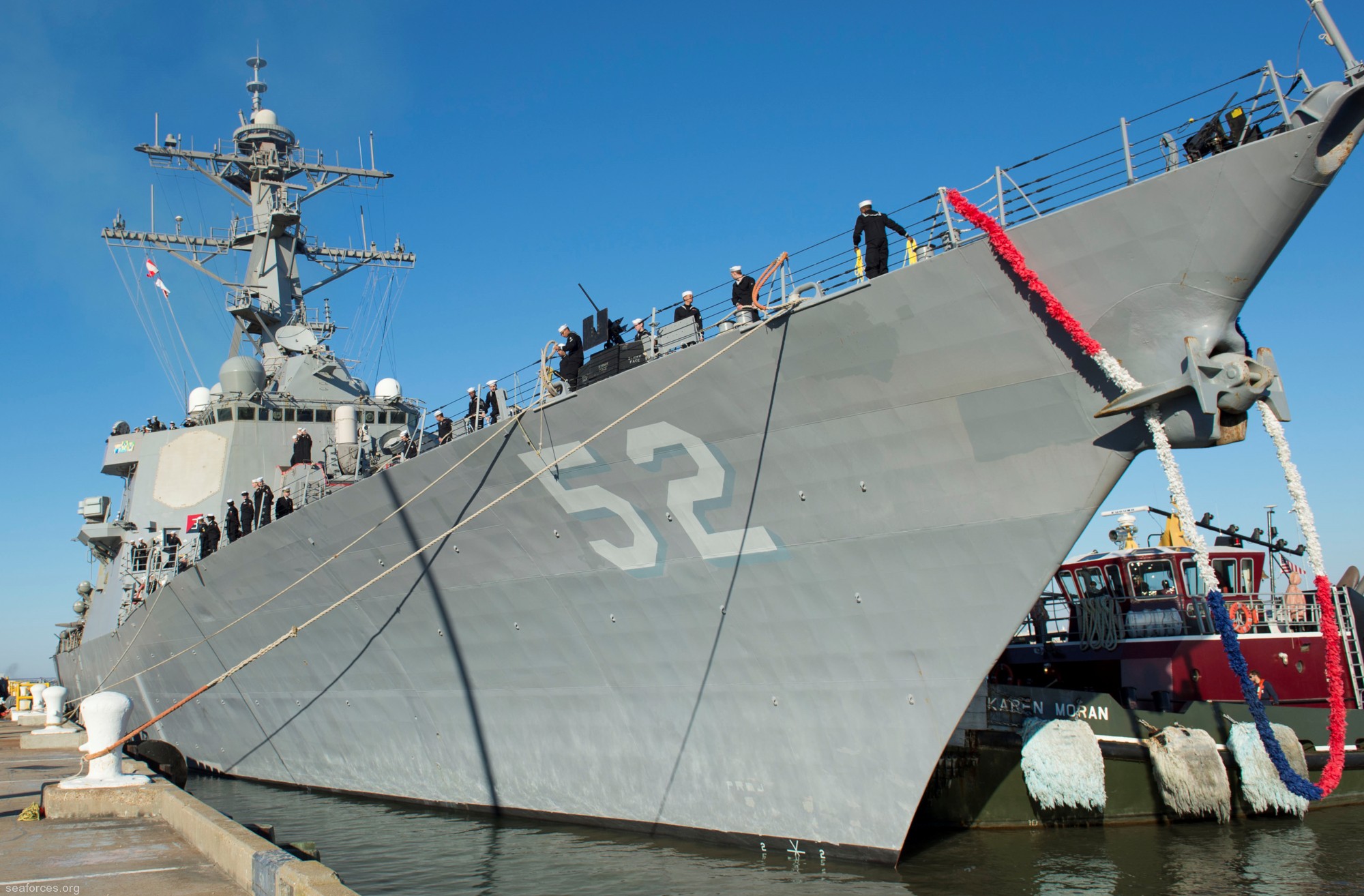 Naval Station Norfolk, Virginia - November 2013  Naval Station Norfolk, Virginia - November 2013  returning to Norfolk, Virginia - November 2013  Mk-45 Mod.2 (5"/54-caliber) gun maintenance - Mediterranean Sea - September 2013  Mk-32 triple torpedo tubes dry firing - Mediterranean Sea - September 2013  Mk-32 triple torpedo tubes exercise - Mediterranean Sea - September 2013  AN/SPG-62 fire control radar - Mediterranean Sea - September 2013  Mediterranean Sea - September 2013  Mediterranean Sea - September 2013  Mediterranean Sea - September 2013  Mk-45 Mod.2 gun - Mediterranean Sea - September 2013  Souda Bay, Crete, Greece - May 2013  Souda Bay, Crete, Greece - April 2013  Souda Bay, Crete, Greece - April 2013  Souda Bay, Crete, Greece - March 2013  Souda Bay, Crete, Greece - March 2013 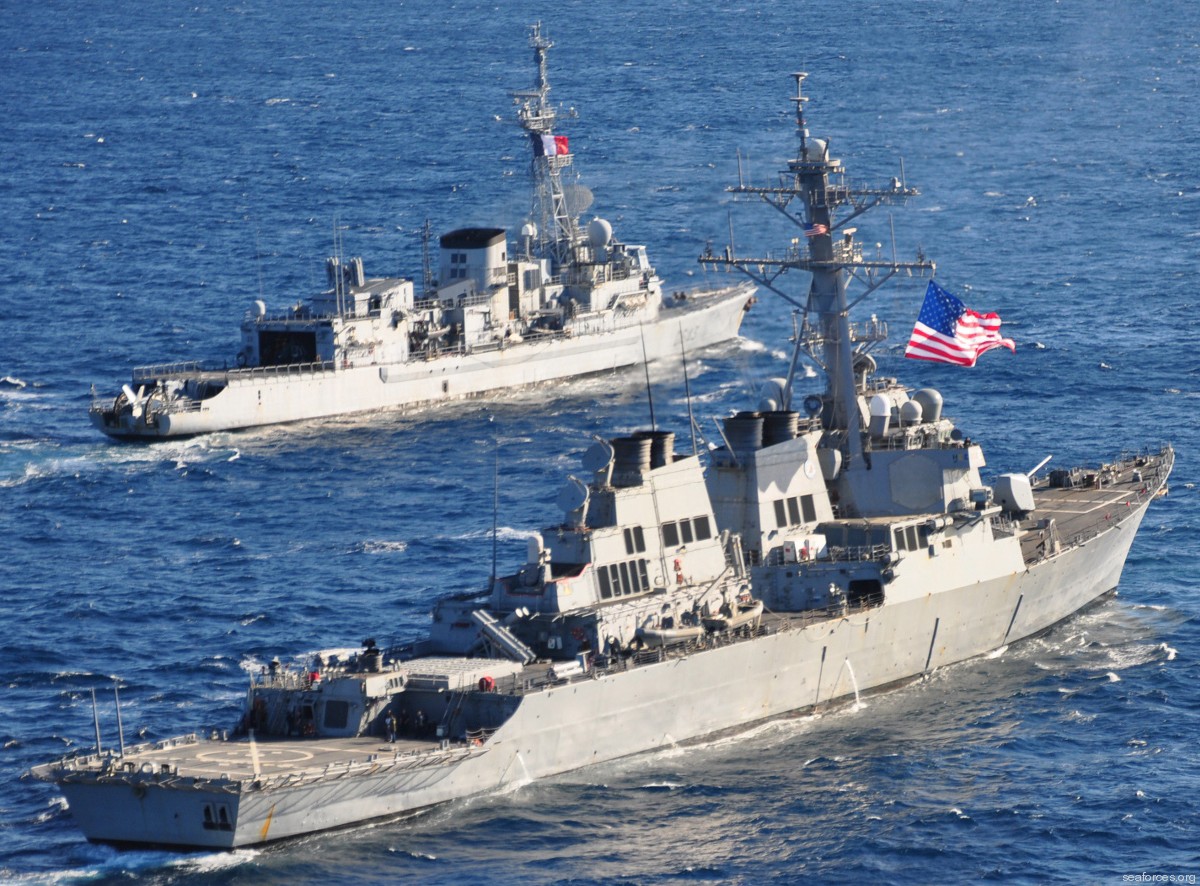 Ionian Sea - February 2013 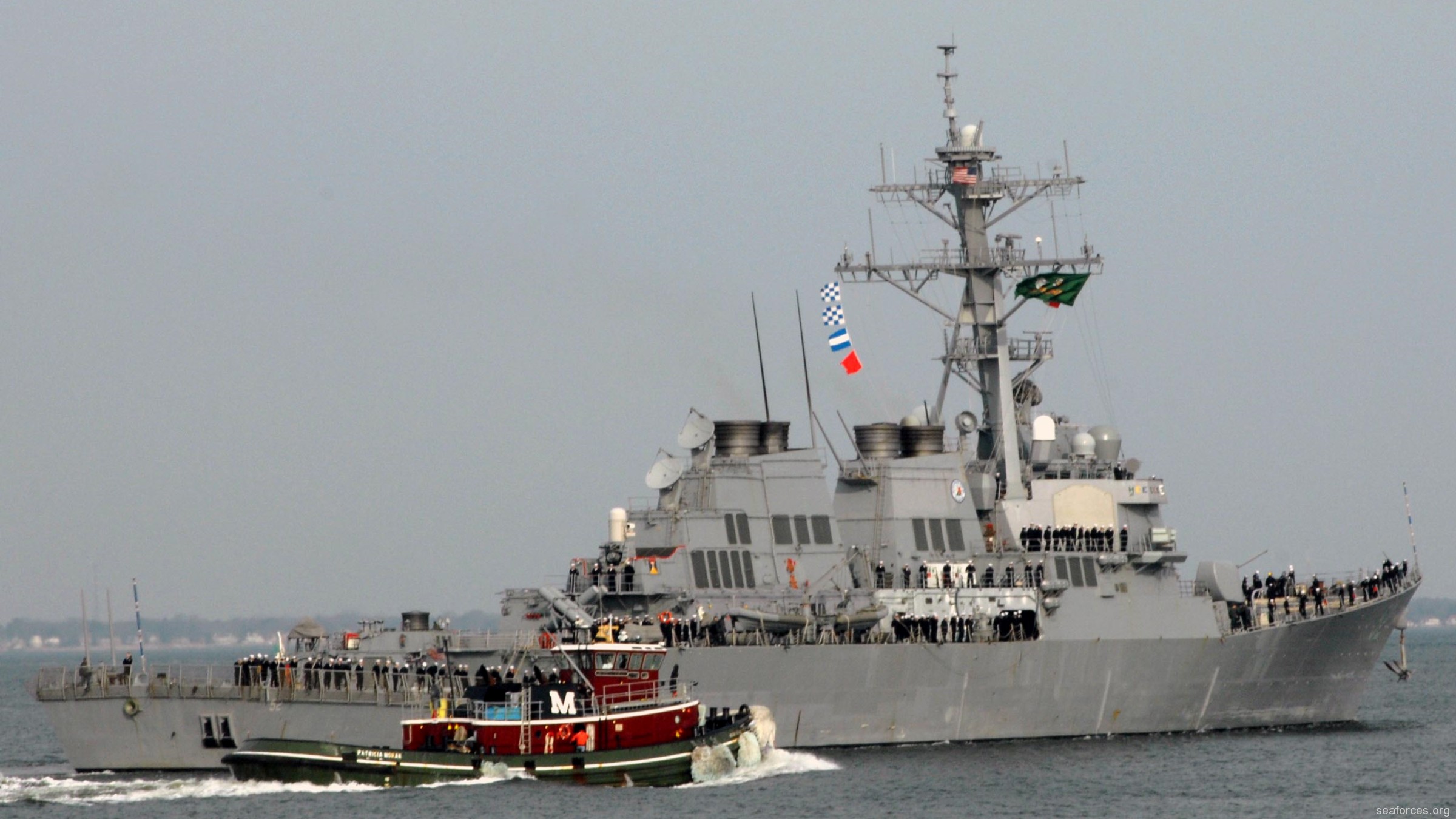 departing Naval Station Norfolk, Virginia - February 2013  departing Naval Station Norfolk, Virginia - February 2013  departing Naval Station Norfolk, Virginia - February 2013  Naval Station Norfolk, Virginia - October 2012  returning to Naval Station Norfolk, Virginia - July 2011  Mediterranean Sea - May 2011  Mediterranean Sea - April 2011  Mediterranean Sea - April 2011  Mk-45 Mod.2 gun fire exercise - Mediterranean Sea - April 2011  USS Barry (DDG 52) launches a Tomahawk missile against Libyan targets in support of Operation Odyssey Dawn. Mediterranean Sea - March 29, 2011  USS Barry (DDG 52) launches a Tomahawk missile against Libyan targets in support of Operation Odyssey Dawn. Mediterranean Sea - March 29, 2011  USS Barry (DDG 52) launches a Tomahawk missile against Libyan targets in support of Operation Odyssey Dawn. Mediterranean Sea - March 19, 2011  USS Barry (DDG 52) launches a Tomahawk missile against Libyan targets in support of Operation Odyssey Dawn. Mediterranean Sea - March 19, 2011 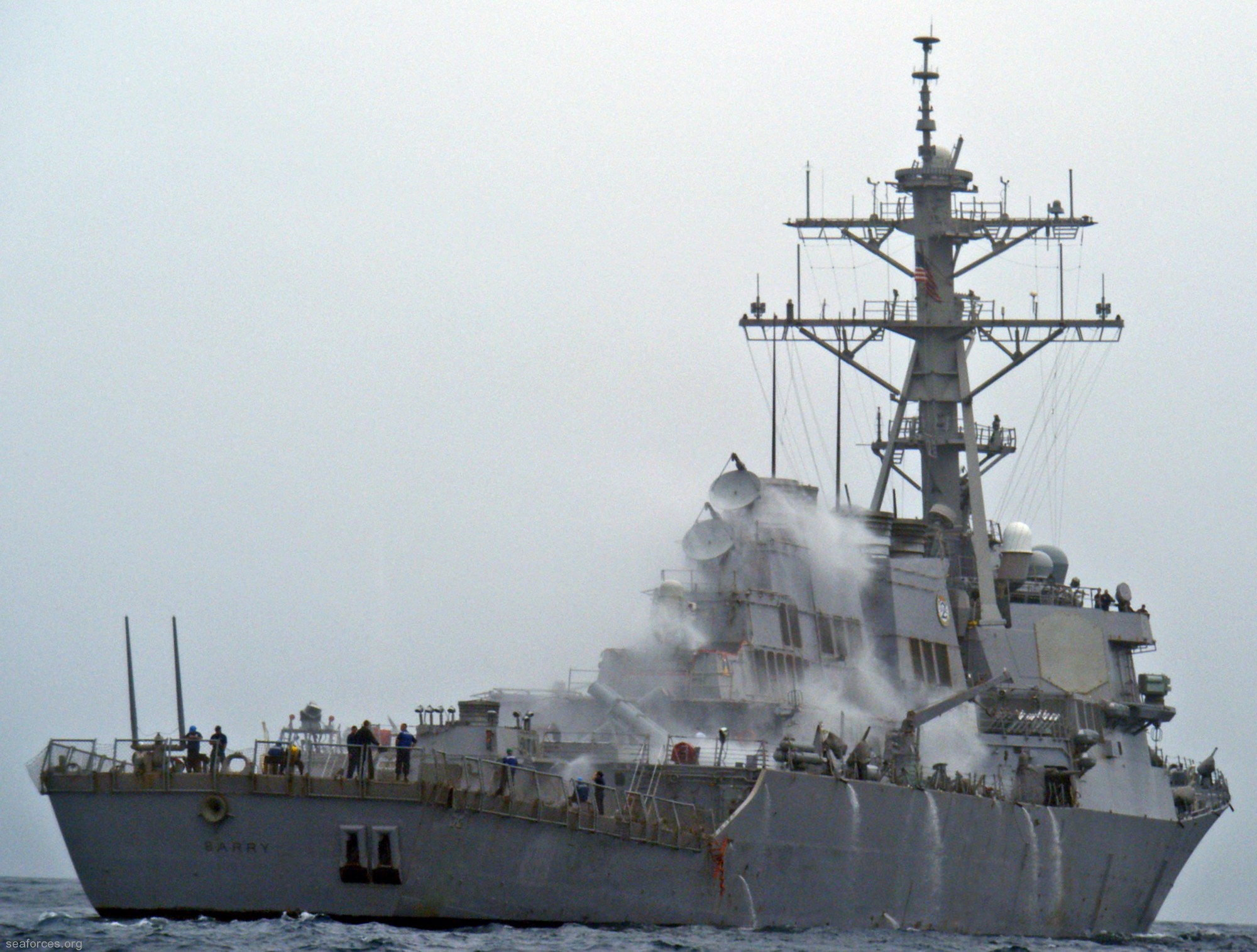 countermeasures washdown sprinkler system test - Gulf of Aden - February 2011  Mayport, Florida - June 2010  Valletta, Malta - January 2009  Valletta, Malta - January 2009  Souda Bay, Crete, Greece - November 2008  Atlantic Ocean - April 2008  Souda Bay, Crete, Greece - July 2006  Souda Bay, Crete, Greece - July 2006  Souda Bay, Crete, Greece - July 2006 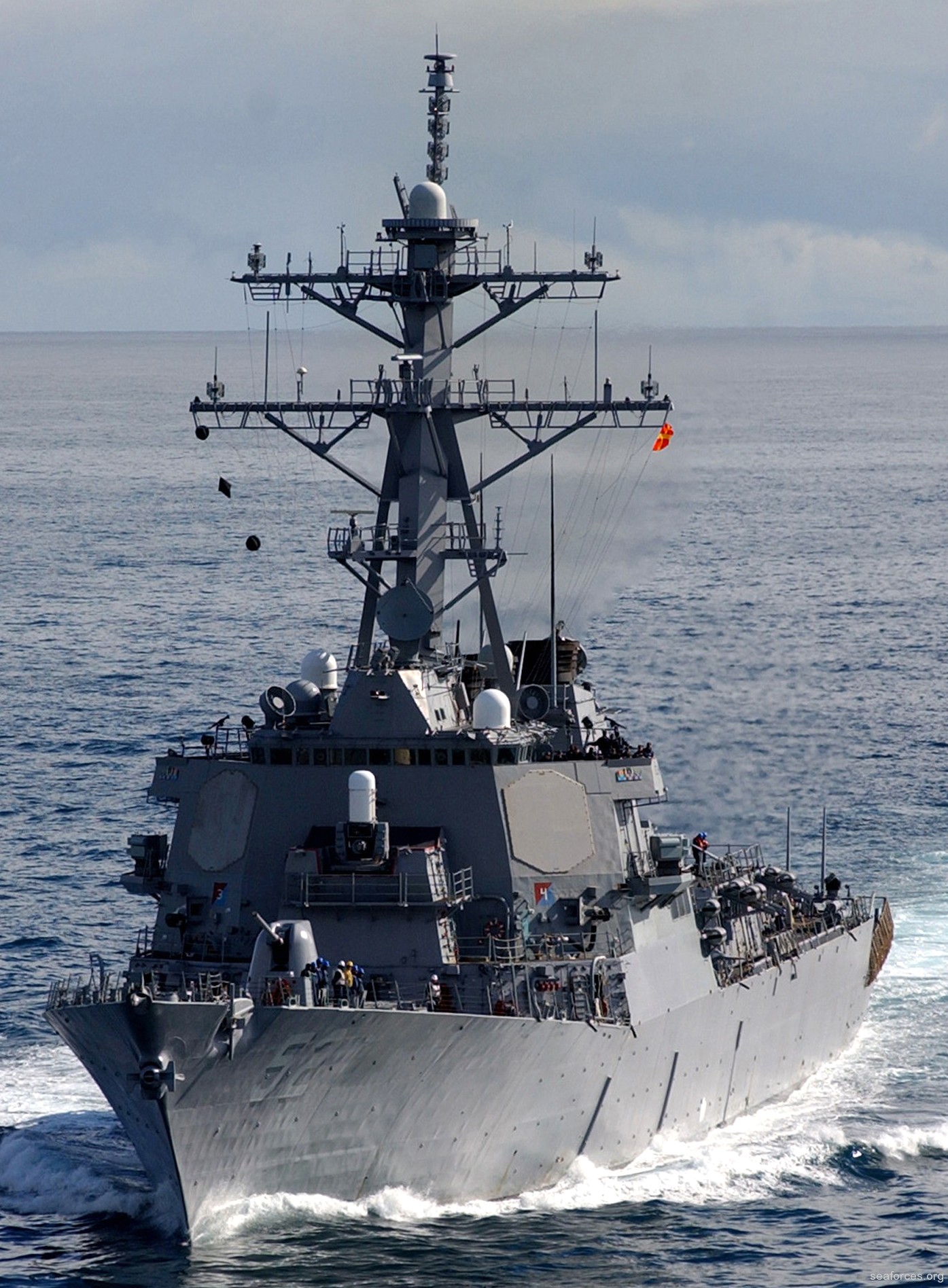 Atlantic Ocean - April 2005  Mediterranean Sea - April 2005  Mediterranean Sea - April 2005  Mediterranean Sea - April 2005 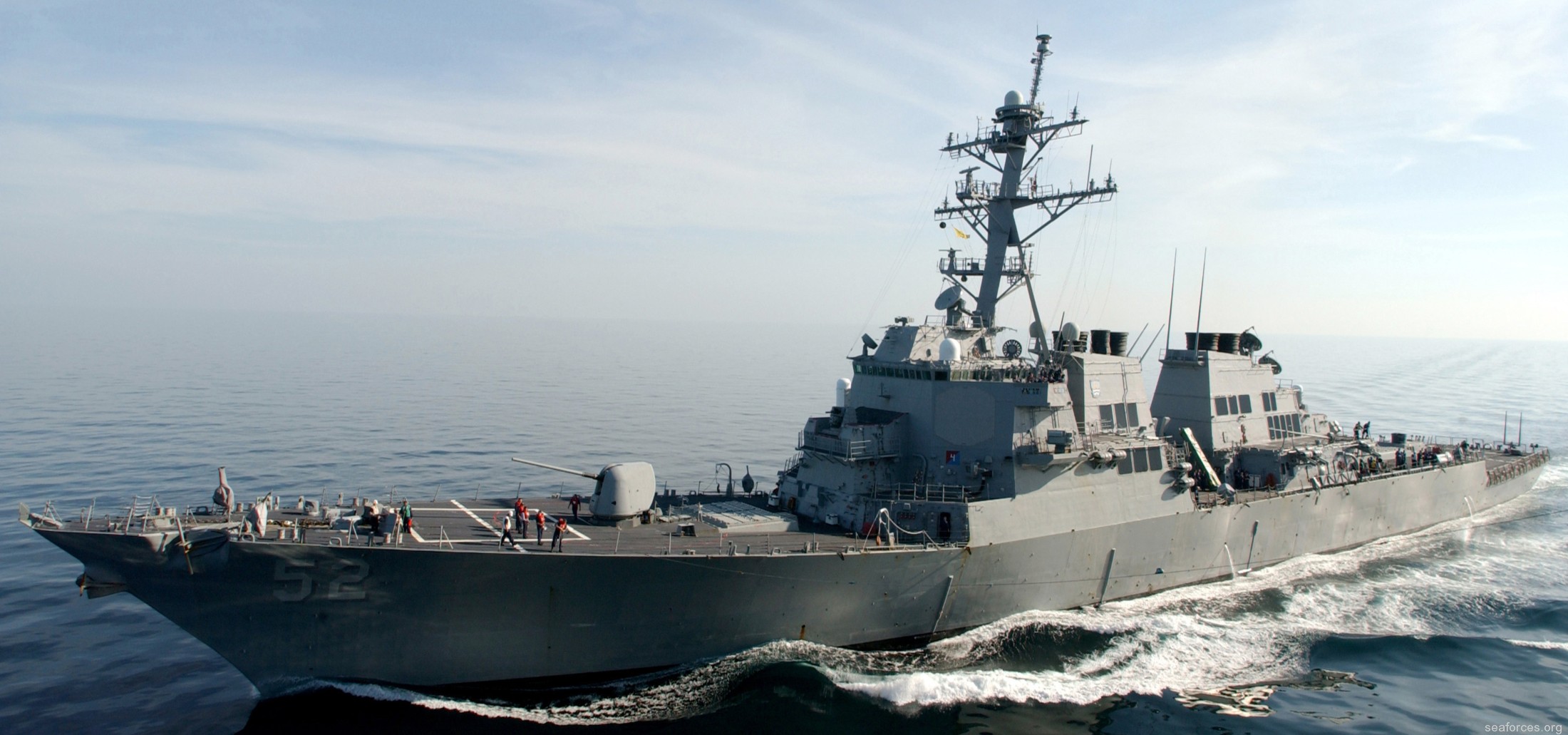 Arabian Gulf - November 2004  Arabian Gulf - November 2004  Atlantic Ocean - July 2004  Atlantic Ocean - June 2004  Mk-45 Mod.2 gun fire exercise - April 2004  November 2003  November 2003  November 2003  November 2003  November 2003  November 2003  November 2003  November 2003  November 2003  November 2003 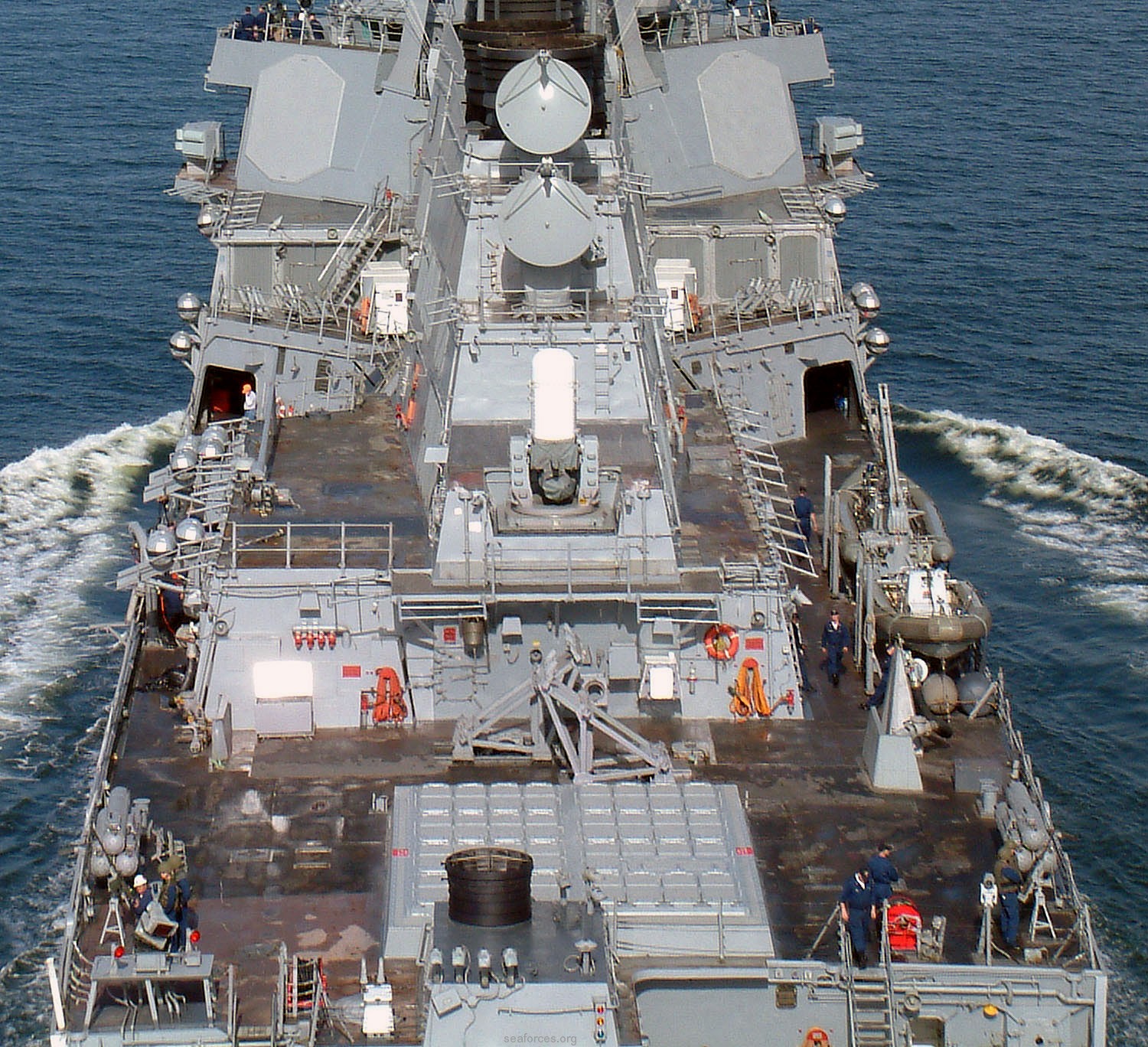 November 2003 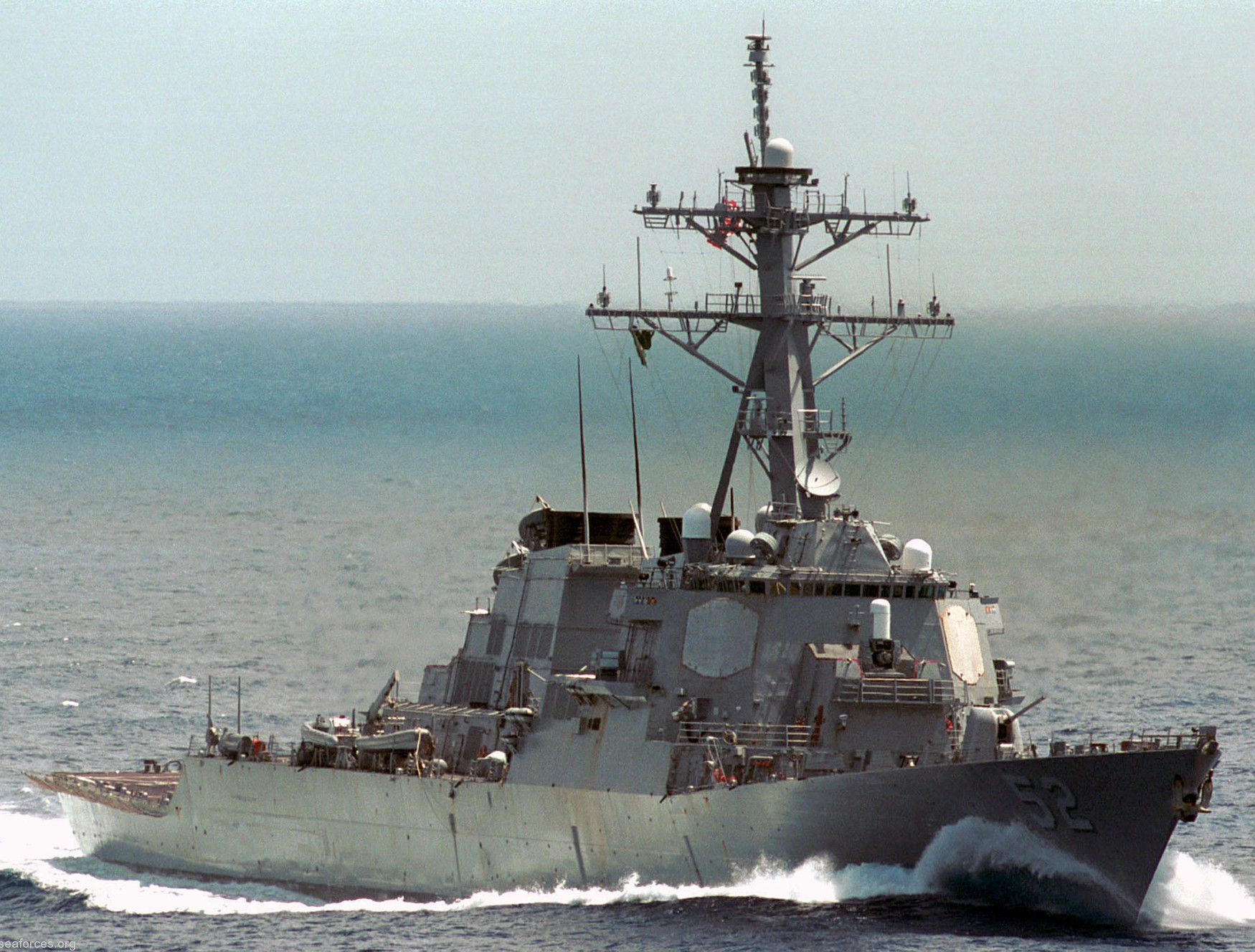 Caribbean Sea - April 2002  Atlantic Ocean - January 1996  August 1995  October 1994 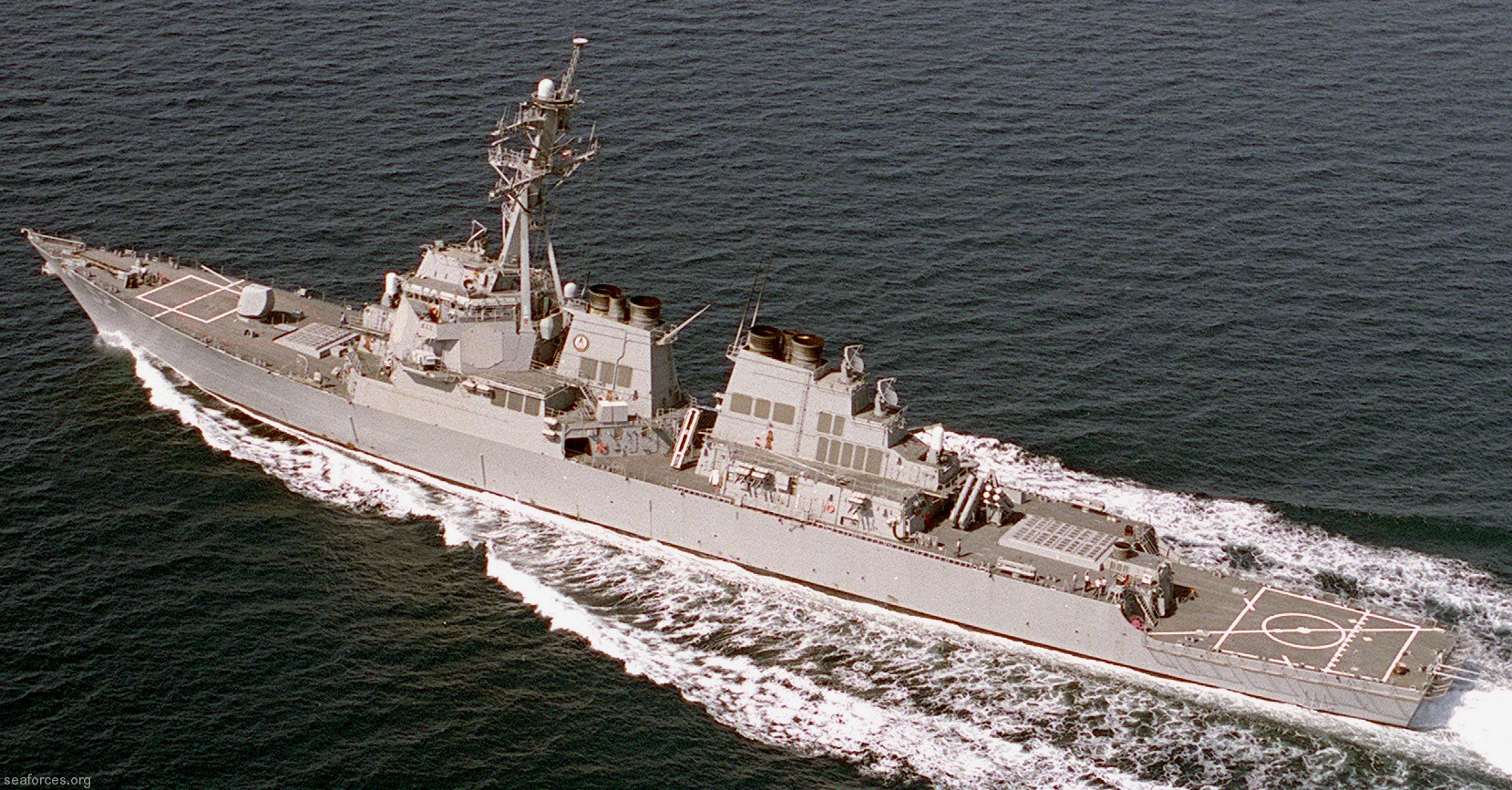 October 1994  October 1994 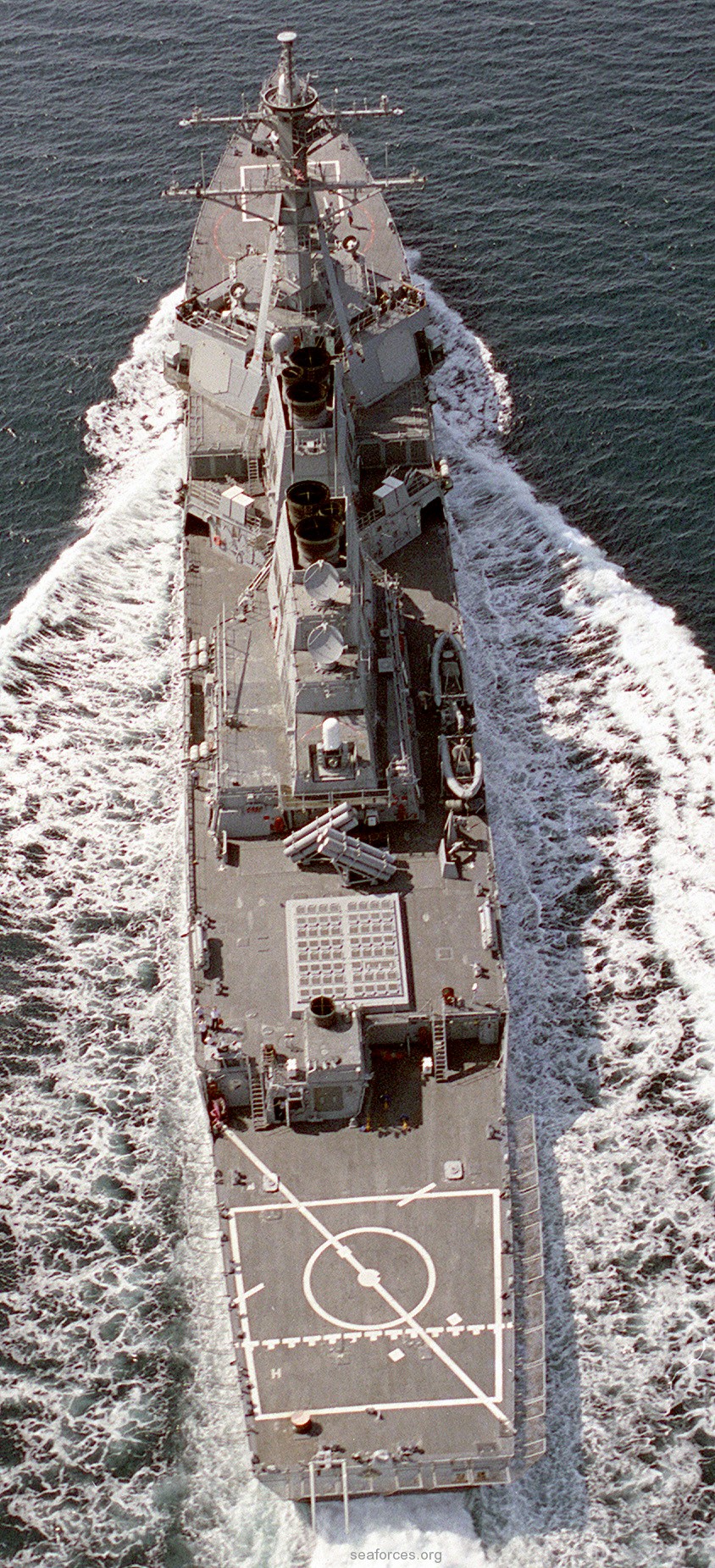 October 1994  October 1994  a Standard Missile SM-2MR was test launched during acceptance trials - August 1992 |
||
|
USS Barry (DDG 52): The fourth Barry (DDG 52) was launched on 10 May 1991 by Ingalls Shipbuilding Inc. and was commissioned into the U.S. Atlantic Fleet on 12 December 1992, being placed under the command of Commander Gary Roughead. The Commissioning ceremony took place at Naval Station Pascagoula in Mississippi. On 21 October 1993, Captain Gary Roughead, Barry's first commanding officer was relieved by Commander James G. Stavridis. In November 1993, Barry received orders to proceed to Haiti to take part in Operation Support Democracy. Barry's duties included enforcing the embargo.On 20 May 1994, Barry departed Norfolk, Virginia on her first Mediterranean deployment. During Barry's maiden deployment, she served alongside the USS George Washington as the backdrop for the 50th anniversary of D-Day. Barry also sailed the Mediterranean and Adriatic Seas as "Red Crown" in support of the No-Fly Zone over Bosnia-Herzegovina. On 7 October 1994, Barry received orders to proceed to the Persian Gulf in response to Iraq's massing of troops on the Kuwaiti border. In what would become known as Operation Vigilant Warrior, Barry's participation included escort of both the George Washington and an amphibious assault group to anchorage off Kuwait City. Barry also served as alternate Persian Gulf Anti-Air Warfare Coordinator (AAWC), and principal Tomahawk strike platform during the crisis. Barry received a Meritorious Unit Commendation, the Southwest Asia Service Medal, the Armed Forces Service Medal, and the NATO Medal for her actions during the deployment and returned home to Norfolk, Virginia on 17 November 1994. In October of 2004, Barry departed for the Persian Gulf in support of Operations Iraqi Freedom and Enduring Freedom as part of the USS Harry S. Truman (CVN 75) Carrier Strike Group. This deployment was part of Summer Pulse 2004, the simultaneous deployment of seven aircraft carrier strike groups (CSGs) which demonstrated the ability of the Navy to provide credible combat power across the globe within five theaters and with other U.S., allied, and coalition military forces. Summer Pulse was the Navy’s first deployment under its new Fleet Response Plan (FRP). During this deployment, Barry also participated in Somalia Operations in the Horn of Africa (HOA). Barry returned from this deployment in March of 2005. In May of 2006, Barry deployed to West Africa and the Mediterranean Sea as an independently steaming unit. She participated in a port visit in Nigeria, as well as Joint Task Force Lebanon. Barry returned from this cruise in November of 2006. During April and May of 2008, Barry participated in Exercise Joint Warrior 08-01 in the North Atlantic. This was a multi-lateral NATO exercise involving ships from over eight countries. Barry departed for a Mediterranean Sea/Persian Gulf deployment as part of Standing NATO Maritime Group Two (SNMG2) in August of 2008. On 1 March 2011 Barry was dispatched to the Mediterranean Sea in response to the 2011 Libyan civil war. On 19 March 2011, the Navy reported that Barry fired 55 Tomahawk cruise missiles to suppress the Libyan air defense system in support of United Nations Security Council Resolution 1973. The official codename for the U.S. part of the operation is Operation Odyssey Dawn. On 28 March, Barry assisted a U.S. Navy P-3C Orion from Patrol Squadron Five and an A-10 Thunderbolt aircraft attacking a group of three Libyan Coast Guard boats which were firing upon merchant vessels. In late August 2013 she was ordered, alongside her sister ships Gravely, Mahan and Ramage to patrol the eastern Mediterranean Sea in response to rising rumors of an imminent military intervention in the Syrian civil war. In early 2016, Barry will conduct a hull swap with USS Lassen, in which the two crews will switch ships. Lassen has operated out of Yokosuka since 2005. Barry will complete midlife modernization prior to making the switch and will be outfitted with Aegis Baseline 9, the latest combat system, which is capable of defensive and offensive operations against aircraft, cruise missiles, ballistic missiles, surface ships, submarines and shore targets. Barry is also to receive fully integrated bridge, quality-of-life upgrades and advanced galley during refit. Barry has received many awards, including the Battenberg Cup for the years 1994, 1996, and 1998, earning her the nickname "Battenberg Barry" in the late 1990s. She has also been awarded the Battle E award 4 times, and received the Golden Anchor and Silver Anchor Awards for retention. More recently, in 2004 the Barry received the Arleigh Burke Fleet Trophy for being the most improved ship in the Atlantic Fleet. source: DDG-52 + wikipedia |
||
|
Commodore John Barry (1745 - September 13, 1803): Born in Wexford, Ireland, in 1745; died in Philadelphia, 13 September 1803. John Barry followed the sea from childhood, and at the breaking out of the hostilities between England and the Colonies, offered his services to Congress. His ship the Black Prince was purchased by the Government and named Alfred, in which John Paul Jones, as a Lieutenant, first hoisted the American (Grand Union) Flag. Captain Barry was given command of Lexington, of 14 guns, on 7 December 1775. The Lexington sailed 31 March 1776. On 7 April 1776, off the Capes of Virginia, he fell in with the Edward, tender to the British man-of-war Liverpool, and after a desperate fight of one hour and twenty minutes captured her and brought her into Philadelphia. Barry continued in command of Lexington until 18 October 1776, and captured several private armed vessels during that time. His next command was the Effingham, to which Congress had appointed him on 6 June 1776 while she was being built. On this ship he was actively and successfully employed guarding the Delaware Bay and Capes. 10 October 1776. Congress established the relative rank of officers of the Continental Navy and placed the name of John Barry No. 7 on the list of captains. December 1776. Barry, having recruited a company of volunteers for land service, took part in the Trenton campaign. These volunteers and the marines cooperating with them were commended by General Washington. Barry acted as an aide to General Cadwalader, and was sent on several occasions as a bearer of important dispatches. His next duty was assisting in the defense of Philadelphia and operations in the upper Delaware. When the British took possession of Philadelphia in September 1777, Captain Barry was ordered to take the uncompleted Continental frigate Effingham up the Delaware River to a place of safety. In October, the ship was ordered sunk or burned. She was sunk on 2 November, near Bordentown, New Jersey, to deny her use to the British. 7 March 1778. He captured the armed schooner Alert of 20 guns, and two ships loaded with supplies for the British Army. Barry next commanded the Raleigh, 32 guns. He sailed from Boston 25 September 1778, and two days later was chased and attacked by three of his Brittanic Majesty's vessels. After a nine hours running fight, he was obliged to run the Raleigh ashore on an island near the mouth of Penobscot Bay, but escaped to the mainland with most of his crew. Though he lost his ship, he was highly commended for the gallantry. The privateer Delaware of 10 guns was the next ship assigned to Captain Barry. In November 1780, Barry was ordered to command the Alliance, 32 guns, and took John Laurens, Special Commissioner, to France. Owing to the difficulty in obtaining a crew, this ship did not sail until 11 February 1781. On the passage to France, she captured the Privateer Alert of 12 guns. On the return voyage the Privateer Mars, 26 guns; and Minerva, 10 guns were made prizes. 29 May 1781. After several hours fighting, Barry captured H.B.M.S. Atlanta, 20 guns, and later the Trepassy, 14 guns. During the engagement with the Atlanta, Barry was wounded. He continued in command of the Alliance, capturing numerous prizes in 1782. March 1783. The last Naval engagement of the Revolutionary War was fought by Barry in the Alliance against the British man-of-war Sybylle of 28 guns. Though the ship surrendered to him he was obliged to abandon it to escape from the rest of the squadron of which she was a part. At the time of the fight with the Sybylle, Barry was convoying the Duc de Lauzane, carrying money and supplies from the West Indies to the United States. His action enabled her to escape and reach port safely. After the close of Revolutionary War, Captain Barry made several voyages in merchant vessels. Upon reorganization of the Navy, 5 June 1794, Captain Barry was appointed No. 1 on the list of Captains. His commission was signed by General Washington, dated 22 February 1797. He was ordered to superintend the building of the frigate United States, 44 guns, and to command her when finished. He was actively engaged in the Naval War with France, 1798-1801 and captured a number of French vessels in the West Indies. By the direction of the Navy Department he brought the United States to Washington, where she was laid up. This ended Barry's active service. He was employed in testing cannon for the Government 1801-1802, and was selected to command the Mediterranean Squadron, but was too ill to take the duty. He died at his country residence near Philadelphia (Strawberry Hill). source: NHHC
|
||
| patches + more | ||

 |
||
| | seaforces.org | USN ships start page | |





